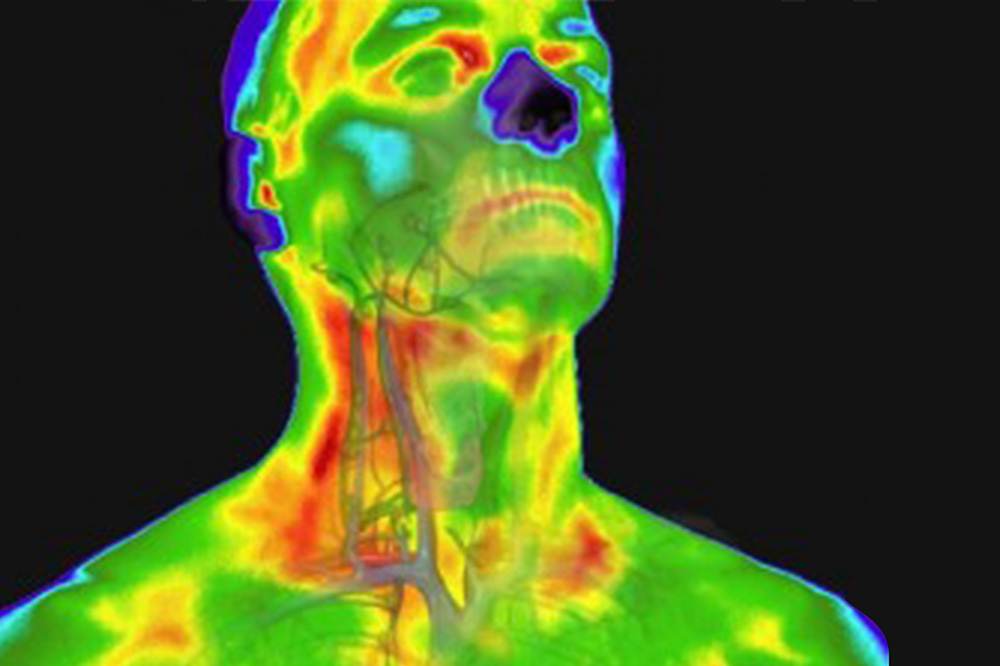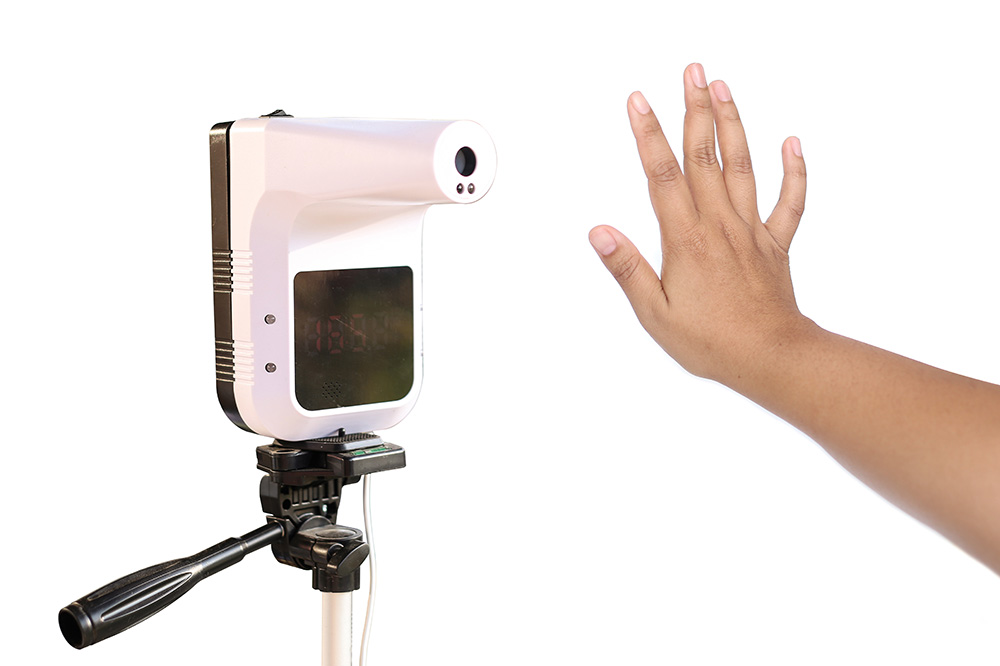Medical Thermography
(Thermal Imaging)
Thermography, also known as thermal imaging or infrared thermography (IRT), is a technique that uses a thermal camera to capture and visualise heat patterns emitted by an object, such as the human body.
These heat patterns can then be used to create a thermal image (thermogram) that reveals variations in temperature.
Medical thermal imaging can be used to detect inflammation, pain, or abnormalities in blood flow in certain conditions.
It’s important to note that thermography is not a standalone diagnostic tool for most medical conditions.
Are You A Suitable Candidate For Medical Thermography?
Please read the information below carefully to evaluate if you are a suitable candidate for this procedure.
Please consult with your practitioner or GP if you are in any doubt.
A consultation is essential prior to taking this treatment.
A complimentary telephone consultation is available, which will enable your practitioner to assess your medical history, your concerns and your personal goals. We can then discuss the desired treatment/s options.
Pre Session
Thermography involves taking a detailed case of your past, present, medical, and family history, including your current emotional state. You will be asked to complete a patient questionnaire and to note any medication or supplements that you are currently taking.
There no contra-indications or medical precautions.
More FAQs
What is Medical Thermography?
Thermal cameras are unlike regular cameras that capture visible light, thermal cameras detect infrared radiation, which is invisible to the human eye. This radiation is emitted by all objects with a temperature above absolute zero.
The intensity of the infrared radiation emitted by an object corresponds to its temperature. The thermal camera translates these variations in temperature into a color-coded image, where hotter areas appear red or yellow, and cooler areas appear blue or green.
Medical Thermography captures and records temperature variations on the skin, which provides vital information directly influenced by complex metabolic and vascular activity.
Medical Thermography is primarily used as a screening tool for certain health conditions.
Thermography helps to identify inflammatory, neovascular and neurological phenomena based on levels of temperature, differences in temperature, and appearance and location thermal patterns.
Inflammation is a vital part of the immune system’s response to injury and infection. It is the body’s way of signalling the immune system to heal and repair damaged tissue, as well as, defend itself against foreign invaders, such as viruses and bacteria.
Thermography may be used as a complementary tool to detect breast abnormalities. If any suspicious finding will be accompanied with a strong and intentional recommendation for further clinical evaluation. If a lump or any other change in your breast is noticed before your next screening thermogram, consult your doctor immediately.
Medical Thermography can help identify musculoskeletal issues through inflammation or pain patterns associated with arthritis, muscle strain, or nerve damage.
In some cases, thermography may be used to assess thyroid function.
Thermograms can be influenced by various factors like ambient temperature, recent activity, or certain medications. This can limit the accuracy of thermography in detecting abnormalities. Precautions are taken to ensure efficiency.
An abnormal thermogram doesn’t necessarily indicate a specific medical condition, further diagnostic tests are needed to confirm any suspicions.
Medical Thermography has some potential uses as a screening tool, but it’s important to be aware of its limitations and use it alongside other diagnostic methods.
What will the treatment involve?
Your medical thermographer will ask you to complete a detailed questionnaire, including your medical and family history. You will be asked to list any medications or supplements that you may currently be taking.
A confidential, in-depth consultation follows, which considers all aspects of your health, including past medical history, lifestyle, personality type and current health problems.
You will be required to keep your clothing on during the medical thermography procedure.
Each selected body zone will receive a captured thermal image.
What Area’s Does Thermography Cover?
Full Body Study
The Full Body Study consists of thirty-seven (37) images covering the entire body.
Treatment time(s): 120 mins
Breast Study
The Breast Study consists of nine (9) images covering the breast, chest and upper back area.
A thermography study can help to identify abnormal vascular patterns which are associated with the development of chronic disease in the breast region and it can also aid in monitoring the structure integrity of implants.
Treatment time(s): 30 mins
Women’s Health Study
The Women’s Health Study (Upper body) consists of thirst-seven (37) images covering the entire body. head and neck, upper back, breast, abdomen and lower back, trunk views.
Treatment time(s): 60 mins
Men’s Health Study
The Men’s Health Study (Upper body) consists of thirst-seven (37) images covering the entire body. head and neck, chest and upper back, abdomen and lower back, trunk views.
Treatment time(s): 60 mins
Why consider Medical Thermography & what can it be used for?
This thermal imaging health study will alert the patient to the regions and conditions which may need further investigation including:
- Fibrocystic breasts
- Breast pain
- Blood perfusion
- Lymphatic congestion
- Dental issues
- Circulation vascular/heart disease
- Musculoskeletal problems
- Metabolic changes
- Digestive imbalance
- Diabetes detection
- Dental issues
How many sessions do I need?
Generally, a single session is required, unless part of a complex treatment plan such as breast cancer, where more imaging may be required.
How quickly will I receive the results?
You will receive the thermographic results 3 days after by email and a free 20-minutes call to explain your results. A full consultation with your practitioner to discuss and devise an appropriate treatment plan based on your results will incur additional costs.
Are there any side effects?
There are no side-effects to medical thermography.
Is Medical Thermography safe?
The Medical Thermography procedure has an excellent safety record. It incorporates non-invasive infra-red images of specific areas of the body, and is proven to be safe when used with adults, the elderly, babies, children, and women during pregnancy, labour, and breastfeeding.
Are there any other important considerations?
While Medical Thermography can be a beneficial additional diagnosis tool for certain health conditions, it’s important to consult a registered naturopathic doctor who works alongside your primary care physician.
Notice to patients presenting with previously diagnosed cancer: Thermography interpretation in your report does not include information or recommendations related to the measured changes of disease beyond skin temperature changes and patterns. As there is no single known test capable of monitoring all biological influences of the complex disease generally diagnosed as cancer, continued monitoring with available additional testing as recommended by your personal physician is strongly advised.
Disclaimer
Any views or advice obtained via this website should not be taken as a substitute
for medical advice or treatment, especially if you are aware of, or suffer from, a specific health complaint.
We recommend that you maintain your relationship with your GP, as thermography and conventional medicine can be integrated to provide complementary services. Your GP will also be able to arrange any diagnostic procedures you may need, and provide emergency cover.
The information on this website is written WITHOUT PREJUDICE
After Care
No specific after care is required.
Price & Practitioner
Health Strategy Call
15 mins – Free
Full body Study 120 mins £499
Breast Study 30 mins £330
Women’s Health Study 60 mins £455
Men’s Health Study 60 mins £455
Additional Practitioner Consultation and Treatment Plan £135
Hope Spring Clinic Other Services:
Click on each service for full details.
Naturopathic Medicine
Functional Laboratory Testing
Immuno-Oncology
Women’s Health MOT
Women’s Fertility MOT
Men’s Health MOT
IV Drip Therapy
Nutritional Therapy
Manual Lymphatic Drainage
Sports & Rehabilitation Therapy
Acupuncture
Hope Spring Clinic Practitioners:
Aliyyaa Spring-Charles BSc (Hons) ND MRN
Naturopathic Medicine, Immuno-Oncology,
Manual Lymphatic Massage, Nutritional Therapy
Functional Laboratory Testing
Maria Liberos
Infusions, Injections, Phlebotomy Services
Dr. Vasileiadis MD FRCP
Prescriptions
Katerina Burianek MSc, DCHAc, CCosD
Acupuncture
Loulla Antoniou ARH, CMA, IAMT, NAANT
Medical Thermography
Aaron Lewis BSc (Hons), mSTA
Sports & Rehabilitation Therapy
Ala Taylor DipCNM, mBANT, mCNHC
Nutitional Therapy, Clinic Administrator
Reviews
Being updated.


Get In Touch To Book Your Treatment
We will then get back to you to organise a call back or an appointment day and time.
